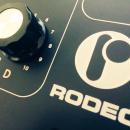Buenas a todos!!! Lo primero deciros que teneis un foro de puta madre en comparación con otros, buen rollo, gente que sabe y por el momento, en lo que he leido poca prepotencia, cosa que en otros se sobran.
Mi pregunta o asunto de cuestión es el siguiente:
Todos, cuando nos vamos a comprar algo, buscamos lo mejor dentro de nuestros posibles. En mi caso ahorre un huevo para pillarme una mesa, y me pille la rodec mx180 mkIII limited edition, pensando que hacia la mejor compra del mundo, por la fama que le precede sobre todo. Mi cuestión es la siguiente: estoy rayado y a punto de venderla para pillarme otra dentro de la misma gama, pero no quiero equivocarme otra vez porque no quiero perder más dinero en el caso de que lo haga, por tanto, que mesa os pillaríais dentro de las que yo considero que están dentro de la gama alta? xone 92, xone 3d, vestax cx, pioneer djm1000 y djm 800.
Por supuesto la gente discrepará conmigo en que si una no es tan buena marca como otras, la otra que es muy cara, etc... pero el tema es que estas son las mesas que se ven en los sitios y dudo mucho que únicamente sea por lo que les pagan, ya que si beringher pagase millonadas no creo que las salas pusieran sus mesas, conque... calidad mínima deben tener, lo digo por pioneer, no soy pro pioneer, que conste, pero... bueno es otro tema.
¿Que mesa de gama alta os pillaríais?¿cambiaríais la mesa?¿hay mucho diferencia entre unas y otras? es para sesión y en concreto house. Conectaría dos platos, dos cds, multiefectos y si me da la economía en breve, otros dos platos para el final (demasiado pero tiene su por qué)
Gracias y perdon por el tostón de tocho que os metido en el primer tema que pongo.
Ciao.
Mi pregunta o asunto de cuestión es el siguiente:
Todos, cuando nos vamos a comprar algo, buscamos lo mejor dentro de nuestros posibles. En mi caso ahorre un huevo para pillarme una mesa, y me pille la rodec mx180 mkIII limited edition, pensando que hacia la mejor compra del mundo, por la fama que le precede sobre todo. Mi cuestión es la siguiente: estoy rayado y a punto de venderla para pillarme otra dentro de la misma gama, pero no quiero equivocarme otra vez porque no quiero perder más dinero en el caso de que lo haga, por tanto, que mesa os pillaríais dentro de las que yo considero que están dentro de la gama alta? xone 92, xone 3d, vestax cx, pioneer djm1000 y djm 800.
Por supuesto la gente discrepará conmigo en que si una no es tan buena marca como otras, la otra que es muy cara, etc... pero el tema es que estas son las mesas que se ven en los sitios y dudo mucho que únicamente sea por lo que les pagan, ya que si beringher pagase millonadas no creo que las salas pusieran sus mesas, conque... calidad mínima deben tener, lo digo por pioneer, no soy pro pioneer, que conste, pero... bueno es otro tema.
¿Que mesa de gama alta os pillaríais?¿cambiaríais la mesa?¿hay mucho diferencia entre unas y otras? es para sesión y en concreto house. Conectaría dos platos, dos cds, multiefectos y si me da la economía en breve, otros dos platos para el final (demasiado pero tiene su por qué)
Gracias y perdon por el tostón de tocho que os metido en el primer tema que pongo.
Ciao.
Responder
Citar











